专题三形容词与副词副词
- 格式:doc
- 大小:57.50 KB
- 文档页数:6
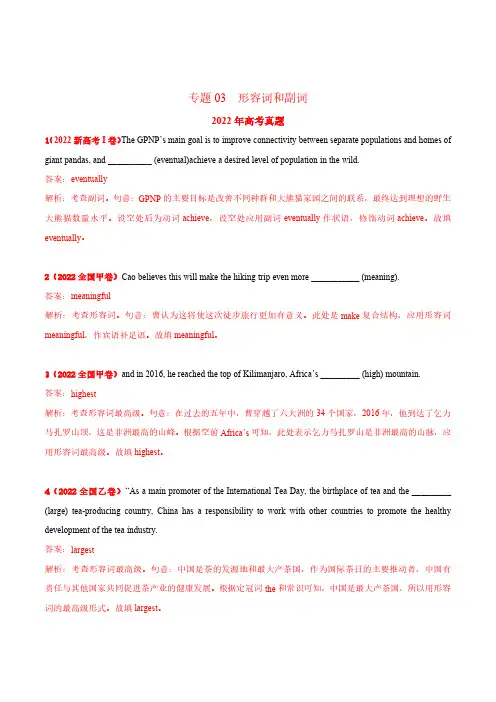
专题03形容词和副词2022年高考真题1(2022新高考I卷)The GPNP’s main goal is to improve connectivity between separate populations and homes of giant pandas,and__________(eventual)achieve a desired level of population in the wild.答案:eventually解析:考查副词。
句意:GPNP的主要目标是改善不同种群和大熊猫家园之间的联系,最终达到理想的野生大熊猫数量水平。
设空处后为动词achieve,设空处应用副词eventually作状语,修饰动词achieve。
故填eventually。
2(2022全国甲卷)Cao believes this will make the hiking trip even more___________(meaning).答案:meaningful解析:考查形容词。
句意:曹认为这将使这次徒步旅行更加有意义。
此处是make复合结构,应用形容词meaningful,作宾语补足语。
故填meaningful。
3(2022全国甲卷)and in2016,he reached the top of Kilimanjaro,Africa’s_________(high)mountain.答案:highest解析:考查形容词最高级。
句意:在过去的五年中,曹穿越了六大洲的34个国家,2016年,他到达了乞力马扎罗山顶,这是非洲最高的山峰。
根据空前Africa’s可知,此处表示乞力马扎罗山是非洲最高的山脉,应用形容词最高级。
故填highest。
4(2022全国乙卷)“As a main promoter of the International Tea Day,the birthplace of tea and the_________ (large)tea-producing country,China has a responsibility to work with other countries to promote the healthy development of the tea industry.答案:largest解析:考查形容词最高级。
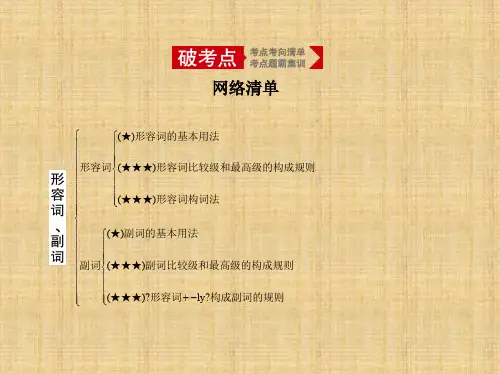
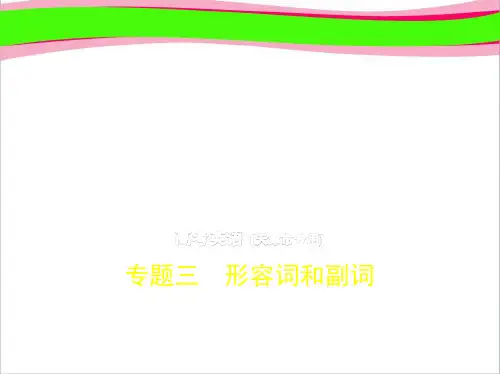
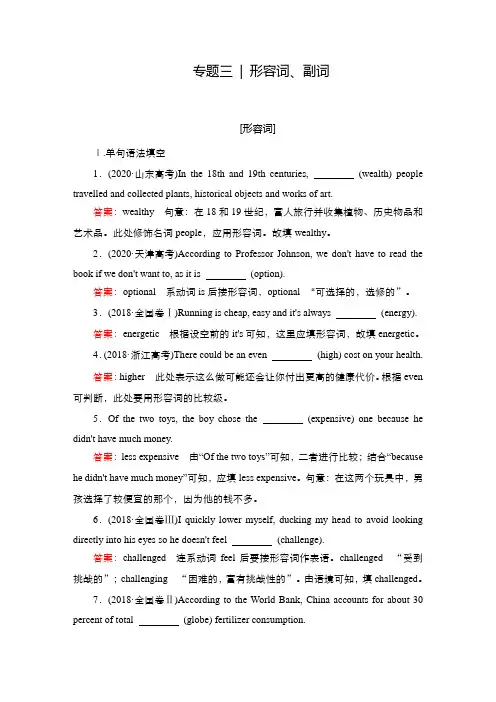
专题三| 形容词、副词[形容词]Ⅰ.单句语法填空1.(2020·山东高考)In the 18th and 19th centuries, (wealth) people travelled and collected plants, historical objects and works of art.答案:wealthy句意:在18和19世纪,富人旅行并收集植物、历史物品和艺术品。
此处修饰名词people,应用形容词。
故填wealthy。
2.(2020·天津高考)According to Professor Johnson, we don't have to read the book if we don't want to, as it is (option).答案:optional系动词is后接形容词,optional “可选择的,选修的”。
3.(2018·全国卷Ⅰ)Running is cheap, easy and it's always (energy).答案:energetic根据设空前的it's可知,这里应填形容词,故填energetic。
4.(2018·浙江高考)There could be an even (high) cost on your health.答案:higher此处表示这么做可能还会让你付出更高的健康代价。
根据even 可判断,此处要用形容词的比较级。
5.Of the two toys, the boy chose the (expensive) one because he didn't have much money.答案:less expensive由“Of the two toys”可知,二者进行比较;结合“because he didn't have much money”可知,应填less expensive。

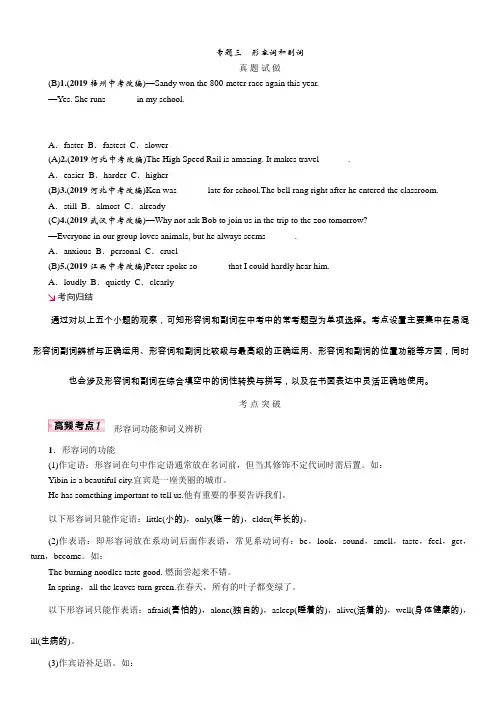
专题三形容词和副词真题试做(B)1.(2019梧州中考改编)—Sandy won the 800-meter race again this year.—Yes. She runs ______ in my school.A.faster B.fastest C.slower(A)2.(2019河北中考改编)The High Speed Rail is amazing. It makes travel ______.A.easier B.harder C.higher(B)3.(2019河北中考改编)Ken was ______ late for school.The bell rang right after he entered the classroom.A.still B.almost C.already(C)4.(2019武汉中考改编)—Why not ask Bob to join us in the trip to the zoo tomorrow?—Everyone in our group loves animals, but he always seems ______.A.anxious B.personal C.cruel(B)5.(2019江西中考改编)Peter spoke so ______ that I could hardly hear him.A.loudly B.quietly C.clearly考向归结通过对以上五个小题的观察,可知形容词和副词在中考中的常考题型为单项选择。
考点设置主要集中在易混形容词副词辨析与正确运用、形容词和副词比较级与最高级的正确运用、形容词和副词的位置功能等方面,同时也会涉及形容词和副词在综合填空中的词性转换与拼写,以及在书面表达中灵活正确地使用。
考点突破形容词功能和词义辨析1.形容词的功能(1)作定语:形容词在句中作定语通常放在名词前,但当其修饰不定代词时需后置。
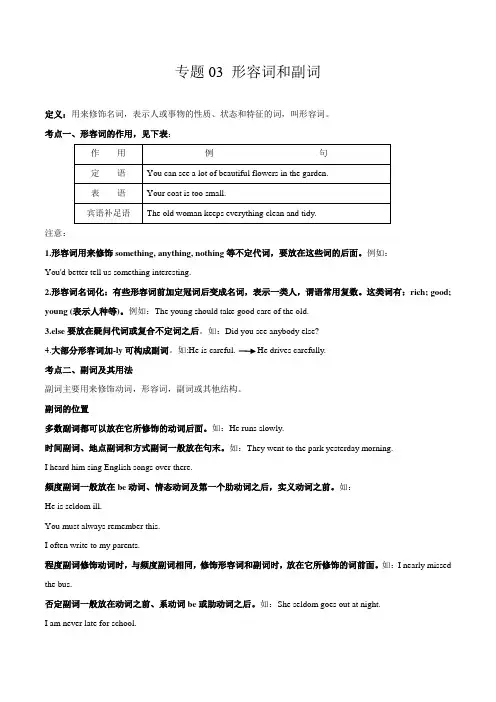
专题03 形容词和副词定义:用来修饰名词,表示人或事物的性质、状态和特征的词,叫形容词。
考点一、形容词的作用,见下表:注意:1.形容词用来修饰something, anything, nothing等不定代词,要放在这些词的后面。
例如:You'd better tell us something interesting.2.形容词名词化:有些形容词前加定冠词后变成名词,表示一类人,谓语常用复数。
这类词有:rich; good; young (表示人种等)。
例如:The young should take good care of the old.3.else要放在疑问代词或复合不定词之后。
如:Did you see anybody else?4.大部分形容词加-ly可构成副词。
如:He is careful. He drives carefully.考点二、副词及其用法副词主要用来修饰动词,形容词,副词或其他结构。
副词的位置多数副词都可以放在它所修饰的动词后面。
如:He runs slowly.时间副词、地点副词和方式副词一般放在句末。
如:They went to the park yesterday morning.I heard him sing English songs over there.频度副词一般放在be动词、情态动词及第一个助动词之后,实义动词之前。
如:He is seldom ill.You must always remember this.I often write to my parents.程度副词修饰动词时,与频度副词相同,修饰形容词和副词时,放在它所修饰的词前面。
如:I nearly missed the bus.否定副词一般放在动词之前、系动词be或助动词之后。
如:She seldom goes out at night.I am never late for school.疑问副词放在特殊疑问句的句首。
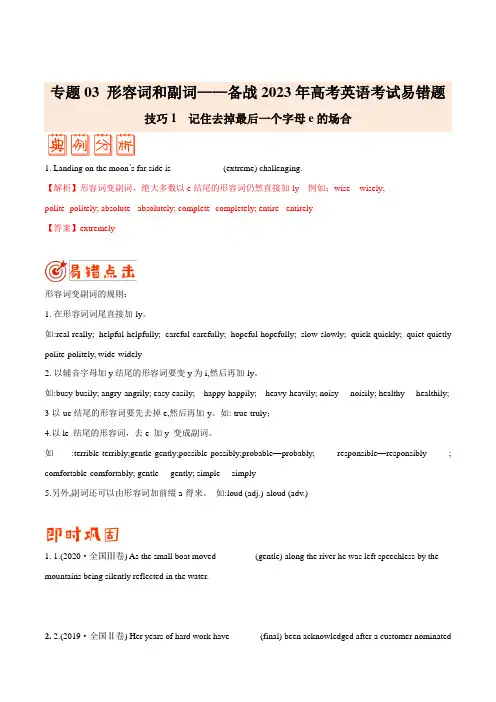
专题03 形容词和副词——备战2023年高考英语考试易错题技巧1 记住去掉最后一个字母e的场合1. Landing on the moon’s far side is ___________ (extreme) challenging.【解析】形容词变副词,绝大多数以e结尾的形容词仍然直接加-ly 例如:wise - wisely;polite -politely; absolute - absolutely; complete -completely; entire - entirely【答案】extremely形容词变副词的规则:1.在形容词词尾直接加-ly。
如:real-really; helpful-helpfully; careful-carefully; hopeful-hopefully; slow-slowly; quick-quickly; quiet-quietly polite-politely, wide-widely2.以辅音字母加y结尾的形容词要变y为i,然后再加-ly。
如:busy-busily; angry-angrily; easy-easily; happy-happily; heavy-heavily; noisy----noisily; healthy----healthily; 3以-ue结尾的形容词要先去掉e,然后再加-y。
如: true-truly;4.以le 结尾的形容词,去e 加y 变成副词。
如:terrible-terribly;gentle-gently;possible-possibly;probable—probably; responsible—responsibly ; comfortable-comfortably; gentle----gently; simple----simply5.另外,副词还可以由形容词加前缀a-得来。
如:loud (adj.)-aloud (adv.)1. 1.(2020·全国Ⅲ卷) As the small boat moved ________ (gentle) along the river he was left speechless by the mountains being silently reflected in the water.2. 2.(2019·全国Ⅱ卷) Her years of hard work have ______ (final) been acknowledged after a customer nominatedher to be Cheshire’s Woman Of The Year.技巧2 熟记形容词和副词的比较级的常用句型情况一遇到与than连用,要想到用比较级1.(全国卷Ⅰ)Finally, that hard work paid off and now the water in the river is ____________(clean) than ever.【解析】cleaner根据后面的than可知此处要用比较级【答案】cleaner2.After a few months, we all felt that we had been able to build much ____________(strong) relationships with the family than we had before.【解析】stronger根据句中的比较级标志词than可知,本句应用比较级,表示几个月后的情况与之前的情况进行比较,much用于修饰比较级。
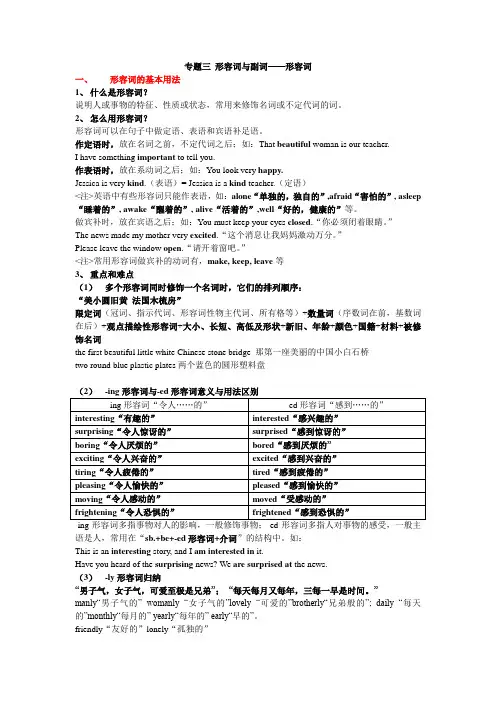
专题三形容词与副词——形容词一、形容词的基本用法1、什么是形容词?说明人或事物的特征、性质或状态,常用来修饰名词或不定代词的词。
2、怎么用形容词?形容词可以在句子中做定语、表语和宾语补足语。
作定语时,放在名词之前,不定代词之后;如:That beautiful woman is our teacher.I have something important to tell you.作表语时,放在系动词之后;如:You look very happy.Jessica is very kind.(表语)= Jessica is a kind teacher.(定语)<注>英语中有些形容词只能作表语,如:alone“单独的,独自的”,afraid“害怕的”, asleep “睡着的”, awake“醒着的”, alive“活着的”,well“好的,健康的”等。
做宾补时,放在宾语之后;如:You must keep your eyes closed.“你必须闭着眼睛。
”The news made my mother very excited.“这个消息让我妈妈激动万分。
”Please leave the window open.“请开着窗吧。
”<注>常用形容词做宾补的动词有,make, keep, leave等3、重点和难点(1)多个形容词同时修饰一个名词时,它们的排列顺序:“美小圆旧黄法国木梳房”限定词(冠词、指示代词、形容词性物主代词、所有格等)+数量词(序数词在前,基数词在后)+观点描绘性形容词+大小、长短、高低及形状+新旧、年龄+颜色+国籍+材料+被修饰名词the first beautiful little white Chinese stone bridge 那第一座美丽的中国小白石桥two round blue plastic plates两个蓝色的圆形塑料盘(2)-ing形容词与-ed形容词意义与用法区别-ing形容词多指事物对人的影响,一般修饰事物;-ed形容词多指人对事物的感受,一般主语是人,常用在“sb.+be+-ed形容词+介词”的结构中。
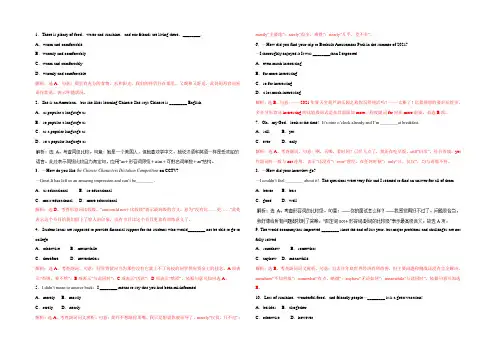
1.There is plenty of food,water and sunshine,and our friends are living there,________.A.warm and comfortableB.warmly and comfortablyC.warm and comfortablyD.warmly and comfortable解析:选A。
句意:那里有充分的食物、水和阳光,我们的伴侣住在那里,又暖和又舒适。
此处用形容词短语作状语,表示伴随状况。
2.She is an American,but she likes learning Chinese.She says Chinese is ________ English.A.as popular a language asB.so popular a language asC.as a popular language asD.so a popular language as3.—How do you like the Chinese Characters Dictation Competition on CCTV?—Great.It has left us an amazing impression and can’t be________.A.as educational B.so educationalC.most educational D.more educational解析:选D。
考查形容词比较级。
“can/could not+比较级”表示最高级的含义,意为“没有比……更……”此处表示这个节目给我们留下了惊人的印象,没有节目比这个节目更富有训练意义了。
4.Student loans are supposed to provide financial support for the students who would________ not be able to go to college.A.otherwise B.meanwhileC.therefore D.nevertheless解析:选A。
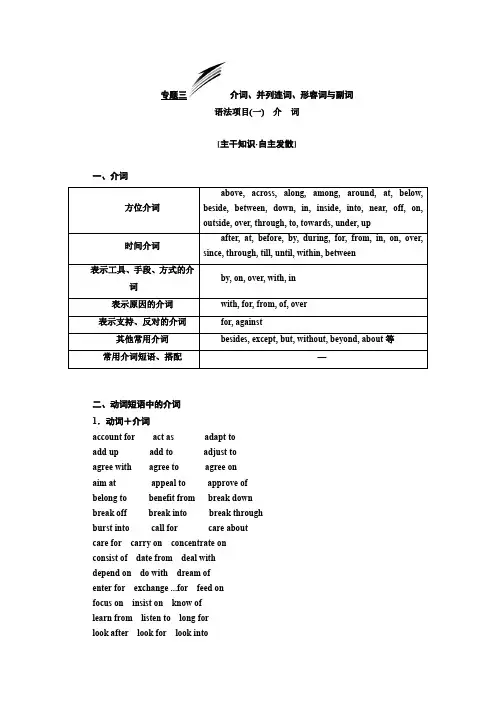
专题三介词、并列连词、形容词与副词语法项目(一)介词[主干知识·自主发散]一、介词二、动词短语中的介词1.动词+介词account for act as adapt toadd up add to adjust toagree with agree to agree onaim at appeal to approve ofbelong to benefit from break downbreak off break into break throughburst into call for care aboutcare for carry on concentrate onconsist of date from deal withdepend on do with dream ofenter for exchange ...for feed onfocus on insist on know oflearn from listen to long forlook after look for look intoobject to refer to result fromresult in run into send forstand for stick to succeed insuffer from think about turn to2.动词+副词+介词add up to break away from catch up withcome up with date back to do well inget down to get on with look down uponlook forward to team up with3.动词+名词+介词catch sight of do harm to have an effect onlose sight of make fun of make room formake sentence with make use of pay attention toplay a part in play a role in play a trick onset an example to show interest in show respect fortake a message for take advantage of take care oftake notice of take part in take the place of[真题集训·全握题点]Ⅰ.单句语法填空1.(2017·全国卷Ⅰ)This trend, which was started by the medical community (医学界)______ a method of fighting heart disease, has had some unintended side effects such as overweight and heart disease — the very thing the medical community was trying to fight.解析:as此处指作为一种抵抗心脏病的方法。
专题三形容词与副词——副词一、副词的基本用法1、什么是副词?(1)定义:副词是用来修饰动词、形容词、副词或全句,在句子中作状语或表语的一类词。
(2)分类:时间副词(now, today, early, sometimes, already等);地点副词(outside, inside, upstairs, here,there,home等);方式副词(quickly,loudly, suddenly, fast, luckily等);程度副词(very, quite, rather, too, much, so等);疑问副词(when,where, why,how, howlong,how often等);关系副词(when, where, why,how等)2、怎么用副词?(1)用法:时间副词——确定句子时态的重要标志,牢固掌握不同时态的时间状语。
如:Lucy wentto school yesterday.(一般过去时时间状语)She has already arrivedthere.(现在完成时时间状语)地点副词——与动词连用时不加介词。
如:I must go homenow.(不是gotohome)That boy rushedupstairs.(不是rushed to upstairs)方式副词——大多数由“形容词+ly”构成。
(构词法)如:happy—happily bad—badlyquick—quickly easy—easily程度副词——有些程度副词可以修饰形容词原级,有些能修饰形容词比较级。
如:Jessica isa very beautiful woman.This bag is muchbett er than that one.疑问副词——用来构成特殊疑问句。
如:Whenis your mother’s birthday? Whereisyourhome?关系副词——用来引导从句,如:He works ina bank where there is nomoney. (2)位置:地点副词、时间副词和方式副词一般放句末。
专题03 形容词和副词2021年高考题【2021·江苏】34. Despite the poor service of the hotel, the manager is _______ to invest in sufficient training for his staff.A. keenB. reluctantC. anxiousD. ready【答案】B【解析】考察形容词词义辨析及语境理解。
句意:尽管旅馆效劳不好,经理还不愿投入为员工提供足够的培训。
A. keen敏锐的;B. reluctant不情愿的;C. anxious渴望的;D. ready准备好的。
应选B。
点睛:此题侧重考察在特定的语境中辨析形容词词义的才能。
因此,考生必须充分利用这一特定语境。
同时,考生应注意多积累由形容词组成的固定短语。
此题中4个选择项中都可以与to连用。
be keen to渴望;be reluctant to不情愿做;be anxious to急于;be ready to乐意,再分析句意可以得出答案。
2021年高考题【2021·江苏卷】29. Only five years afte r Steve Jobs’ death ,smart –phones defeated _______ PCs in sales.A. controversialB. contradictoryC. confidentialD. conventional 【答案】D考点:考察形容词的辨析【2021·江苏卷】34. The disappearance of dinosaurs is not necessarily caused by astronomical incidents. But _______ explanations are hard to find.A. alternativeB. aggressiveC. ambiguousD. apparent【答案】A【解析】试题分析:考察形容词的辨析。
专题3形容词和副词形容词和副词在高考试题中始终占很重要的地位。
近几年高考对形容词和副词的考查具有“淡化语法、注重深层语义”的特点,以形容词和副词辨析为热点。
同时继续加强对形容词和副词比较等级的考查。
其考点主要包括:1.考查形容词和副词词义辨析。
2.考查形容词修饰名词时的词序,即指示代词/不定代词+数词(序数词、基数词)+描绘性形容词+特征性形容词(大小、长短、高低、形状、年龄、新旧)+颜色形容词+国籍、出处+物质、材料+用途、类别+中心名词。
3.考查形容词和副词比较等级的常用句型及其修饰成分在句中的位置。
4.考查与形容词和副词有关的习语结构。
知识点一、形容词和副词的基本用法1.形容词在句中的作用。
(1)形容词在句中可作定语、表语和补语。
(2)形容词在句中也可作状语,用来表示主语所处的状态。
He was lying in bed,dead.(3)alone/afraid/asleep/awake/alive/ashamed/ill/well(身体好)等常用作表语而不用作定语。
如:He is an ill man.(错)The man is ill.(对)She is an afraid girl.(错)The girl is afraid.(对)(4)twoyearold/200metrelong/onethousandword等复合形容词中的名词要用单数,一般只用作前置定语。
如:Tom is a twoyearold boy.2.副词在句中的作用。
副词在句中一般用作状语,修饰动词、形容词或其他副词,也可修饰整个句子。
如:Obviously you are wrong.知识点二、常用连接性副词的用法1.though用作副词时,常在句末,意为“然而,可是”,表示转折意义。
2.therefore“因此,所以”,表示结果。
专题三词法—形容词和副词知识点一般来说,中文意思是“……的”的词是形容词,而中文意思是“……地”的词是副词。
一、形容词1.用来描述人或事物特征、性质或状态的一种开放性词汇,主要用来修饰名词和代词,eg:He is a clever boy.他是一个聪明的男孩。
(形容词clever修饰名词boy)I have something important to tell you.我有重要的事告诉你。
(important修饰something)2.表示状态、性质的反义形容词。
small—big right—wrong new—old hard—easy3.形容是用来修饰物体的形状,大小,长度,属性,特点等,位于名词的前面。
如:He is a hard-working student.(努力的→特点)Our English teacher has long hair.(长的→长度)The elephants are very big, and the mice are very small.(大的、小的→大小)二、副词1.副词是一种用来修饰动词、形容词、副词或全句的词,说明时间、地点、程度、方式等概念的词汇,eg:You speak English well.你英语讲得很好He often works late.他常常工作到很晚。
2.英语中的形容词和副词,在句子里表示“比较……”、“最……”时,要用特别的形式,即:比较级和最高级。
原来的形式称1.2.The blue pen is longer than the black one. 蓝色的钢笔比黑色的长。
3.The red pen is the longest of the three. 红色的钢笔是三支中最长的。
四、形容词、副词比较级的用法表示两者间的比较用比较级。
其常见句式有:1.“A + be +形容词比较级+ than + B”,意思为“A比B更……”。
专题三形容词与副词——副词一、副词的基本用法1、什么是副词?(1)定义:副词是用来修饰动词、形容词、副词或全句,在句子中作状语或表语的一类词。
(2)分类:时间副词(now, today, early, sometimes, already等);地点副词(outside, inside, upstairs, here, there, home等);方式副词(quickly, loudly, suddenly, fast, luckily等);程度副词(very, quite, rather, too, much, so等);疑问副词(when, where, why, how, how long, how often等);关系副词(when, where, why, how等)2、怎么用副词?(1)用法:时间副词——确定句子时态的重要标志,牢固掌握不同时态的时间状语。
如:Lucy went to school yesterday.(一般过去时时间状语)She has already arrived there.(现在完成时时间状语)地点副词——与动词连用时不加介词。
如:I must go home now.(不是go to home)That boy rushed upstairs.(不是rushed to upstairs)方式副词——大多数由“形容词+ly”构成。
(构词法)如:happy—happily bad—badly quick—quickly easy—easily程度副词——有些程度副词可以修饰形容词原级,有些能修饰形容词比较级。
如:Jessica is a very beautiful woman. This bag is much better than that one.疑问副词——用来构成特殊疑问句。
如:When is your mother’s birthday? Where is your home?关系副词——用来引导从句,如:He works in a bank where there is no money.(2)位置:地点副词、时间副词和方式副词一般放句末。
如:I will wait for you here. Can you meet me tomorrow? Please speak loudly.<注>当强调时间状语时,可以把时间副词放在句首。
如:Tomorrow I will meet you.程度副词修饰动词时,放在be动词、情态动词和助动词之后,实动词之前。
如:She is too young. I really like that boy.修饰形容词、副词时,放在被修饰词前面。
如:Harbin is a very big city.(修饰形容词)He studies much harder now. (修饰副词)<注>只有enough特殊,放在被修饰的形容词或副词之后。
如:He runs fast enough.(3)形近副词辨析★close & closelyclose“接近”closely“仔细地”He is sitting close to me.“他挨着我坐着。
”I watch him closely.“我仔细地打量他。
”★late & latelylate“晚”lately“最近”Don’t go to school too late.“上学别太晚了。
”Is there anything new lately?“最近有什么新消息么?”★deep & deeplydeep“深”表示空间深度;deeply“深深地”表示感情上的深度。
The boy went deep into the forest.“那个男孩走进了丛林深处。
”I love you deeply.“我深深的爱着你。
”★high & highlyhigh“高”表示空间上的高度;highly“高”表示程度,相当于much。
The plane was flying high.“飞机飞得高。
”I think highly of your opinion.“我仔细考虑你的观点。
”★wide & widelywide“宽”表示空间上的宽度;widely“广泛地”“在许多地方”表示抽象的含义。
He opened the door wide.“他把门开大。
”English is widely used in the world.“英语在全世界被广泛的应用。
”★free & freelyfree“免费”;freely“无限制地”You can eat free in my restaurant.“你可以在我的餐厅免费用餐。
”You may speak freely.“你可以畅所欲言。
”★hard & hardlyhard“努力地,辛苦地,剧烈地,猛烈地”表示程度;hardly“几乎不”表示否定。
We should study hard.“我们应该努力学习。
”I can hardly catch up with you.“我快跟不上你了。
”【习题讲解】1. Come____ quickly. I have something interesting to tell you.A. to hereB. up to hereC. hereD. into here2. How ___ the girls are playing!A. happyB. happierC. happilyD. happily3. The night was very ___, so he had to take off his shoes ___.A. quiet; quietlyB. quite; quicklyC. late; quickD. quite; quietly4. We have been to the China Folk Culture Villages ____.A. latelyB. lateC. latestD. last5. He got back ____ at four.A. to homeB. at homeC. his homeD. home6. Pass my glasses to me, Jack, I can read the word in the newspaper.A. hardlyB. reallyC. ratherD. almost7. Don’t worry, sir. I’m sure I can run to catch up with them.A. fast enoughB. enough fastC. slowly enoughD. enough slowly8. —English is too difficult for me. I can’t learn it well.—Don’t give up. Nothing is difficult if you work hard.A. seldomB. neverC. alwaysD. usually9. Will you please speak ? I’m afraid I can’t follow you.A. loudlyB. pleasantlyC. slowlyD. easily10. Alice eats meat so that she can keep herself from getting too fat.A. rarelyB. alwaysC. nearlyD. carefully二、副词原级的用法1、副词的排序(1)时间、地点副词,小单位在前,大单位在后。
如:Come to see me at 3 o’clock(小时间) in the afternoon.(大时间)(2)方式副词,短的在前,长的在后。
如:Please write slowly and carefully.(3)多个不同副词排序:程度+方式+地点+时间如:He walked very fast outside this morning.“今天早晨他在外面走得很快。
”2、频度副词频度副词是表示动作发生频率的一类副词,属于时间副词的一种。
常用频度副词always>usually>often>sometimes>never频度副词的位置:在be动词、情态动词和助动词之后;实义动词之前。
如:She is always kind to us. “她对我们总是很好。
”The work has never been done.“这项工作永远也做不完。
”He often goes to school early.“他常常很早到校。
”3、易混副词用法辨析(1)too, as well, also与either都表示“也”too, as well, also都用在肯定句中,too 和as well常常放在句尾;also与动词连用,常放在句中。
either用在否定句中,往往放在句尾。
如:He went there too / as well. = He also went there. “他也去那里了。
”He didn’t go there either.“他也没去那里。
”(2)too, enough与sotoo“太,很”too……to结构“太……而不能……”;enough“足够”……enough to“足够……做……”;so“如此” so……that……“如此……以至于……”。
如:Robert is too young to go to school.= Robert is not old enough to go to school.= Robert is so young that he can not go to school.“罗伯特太小了不能去上学。
”(3)much too与too muchmuch too“非常,极其,太”,修饰形容词或副词,加强语气。
too much“太多”,修饰不可数名词,与too many相似。
如:This book is much too dear.“这本书太贵了。
”Please don’t eat too much ice cream.“请别吃太多冰激凌。
”(4)already, yet与stillalready, yet“已经”标准的现在完成时时间状语,already用在肯定句中,表示事情已经发生,yet用在否定和疑问句中,表示期待某事发生。
still“仍然”,表示事情还在进行。